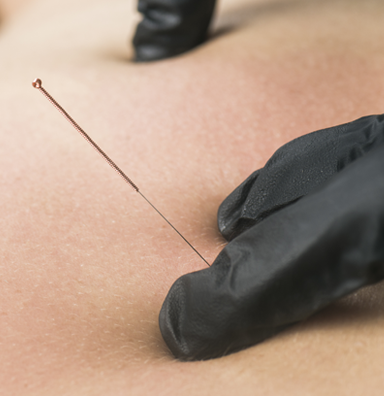Dry needling is a technique physical therapists use for the treatment of pain and movement impairments. The technique uses a "dry"needle, one without medication or injection, inserted through the skin into areas of the muscle. Other terms commonly used to describe dry needling, include trigger point dry needling, and intramuscular manual therapy. Dry needling is not acupuncture, a practice based on traditional Chinese medicine and performed by acupuncturists. Dry needling is a part of modern Western medicine principles, and supported by research.

Which conditions can be treated with Dry Needling?
- Back and neck pain, including postural problems and tension
- Arm pain (shoulder impingements, tennis or golfer’s elbow)
- Headacheo Buttock and leg pain (including sciatic pain)
- Hamstring strainso Knee paino Calf tightness or cramps
What is a Trigger Point?
A trigger point is a taut band of skeletal muscle located within a larger muscle group. Trigger points can be tender to the touch, and touching a trigger point may cause pain to other parts of the body.
What Kind of Needles Are Used?
Dry needling involves a thin filiform needle that penetrates the skin and stimulates underlying myofascial trigger points and muscular and connective tissues. The needle allows a physical therapist to target tissues that are not manually palpable. Physical therapists wear gloves and appropriate personal protective equipment (PPE) when dry needling, consistent with Standard Precautions, Guide to Infection Prevention for Outpatient Settings, and OSHA standards. The sterile needles are disposed of in a medical sharps collector.
Does Dry Needling hurt?
Typically, patients will feel some level of discomfort, but it is short-lived. If one does not feel the treatment at all, it is not yet working.
Is Dry Needling safe?
We go to great lengths to ensure safety. Physical Therapists have all passed their necessary board exams, and have an exhaustive understanding of anatomy. We apply OSHA standards, use personal protective high-quality equipment, and proudly hold to the highest standards of safety.
How will I feel after having treatment done?
There may be some soreness immediately after treatment in the area of the body that was Dry Needled. This is normal, although does not always occur. Occasionally, soreness develops a few hours later, or even the next day. The soreness may vary depending on the area of the body that was treated, and also varies person-to-person, but typically it feels like you have had an intense workout at the gym. Occasionally patients will experience some bruising with this soreness. A patient may also feel tired, nauseous, emotional, and/or somewhat “out of it” after treatment. This is a normal response.
How many sessions of Dry Needling will I need?
Dry Needling patients average 2-3 sessions, and will not use more than 5-6 except in rare circumstances. Often we will use Dry Needling once or twice per week out of 2-3 visits. Some patients require 1-2 sessions, while others require 8-10. Individual results will vary.
Will Dry Needling be done at my first appointment?
We do not typically use Dry Needling at a patient’s first appointment unless they fit a classic “trigger point” presentation. We may introduce a patient to Dry Needling at an initial appointment, educating on the procedure, benefits, risks and side effects; and then use the procedure on subsequent visits.
Can I come in just for a Dry Needling appointment?
Yes. Although we do recommend that Dry Needling be a part of a comprehensive physical therapy treatment program, however, we do offer Dry Needling as a stand alone treatment (~20 min). During this treatment, our therapists will also recommend stretching and exercises specific to you area of pain and dysfunction to assist in effectiveness of treatment.
How much does Dry Needling cost?
FYZICAL Therapy & Balance Centers - North Cary charges $120 for the initial evaluation and any treatments on the initial visit. Each consequent visit costs $35 (1-2 muscle sites) and $55 (3+ muscle sites). Insurance may cover Dry Needling in some instances, but typically it is an out-of-pocket expense.